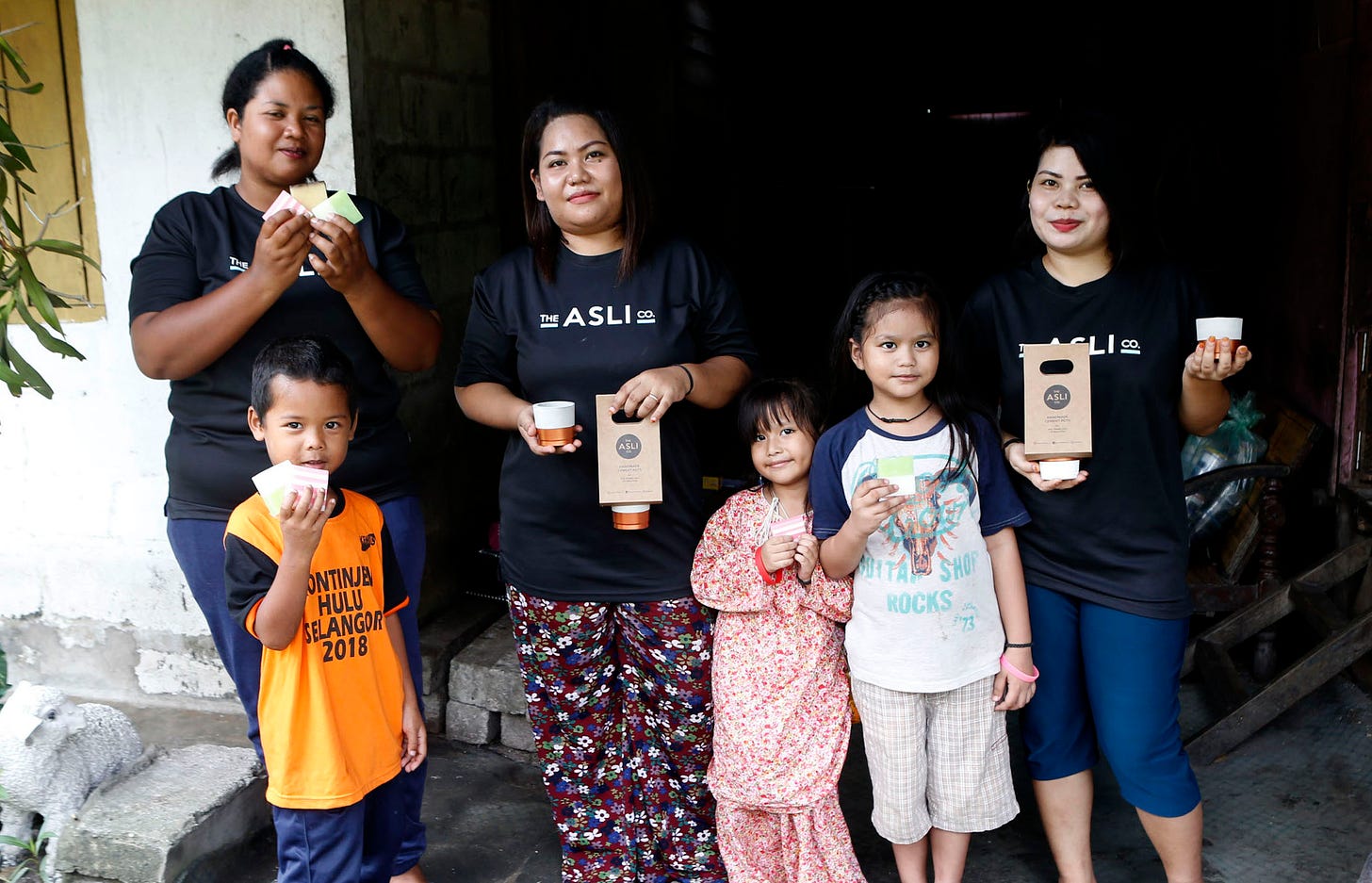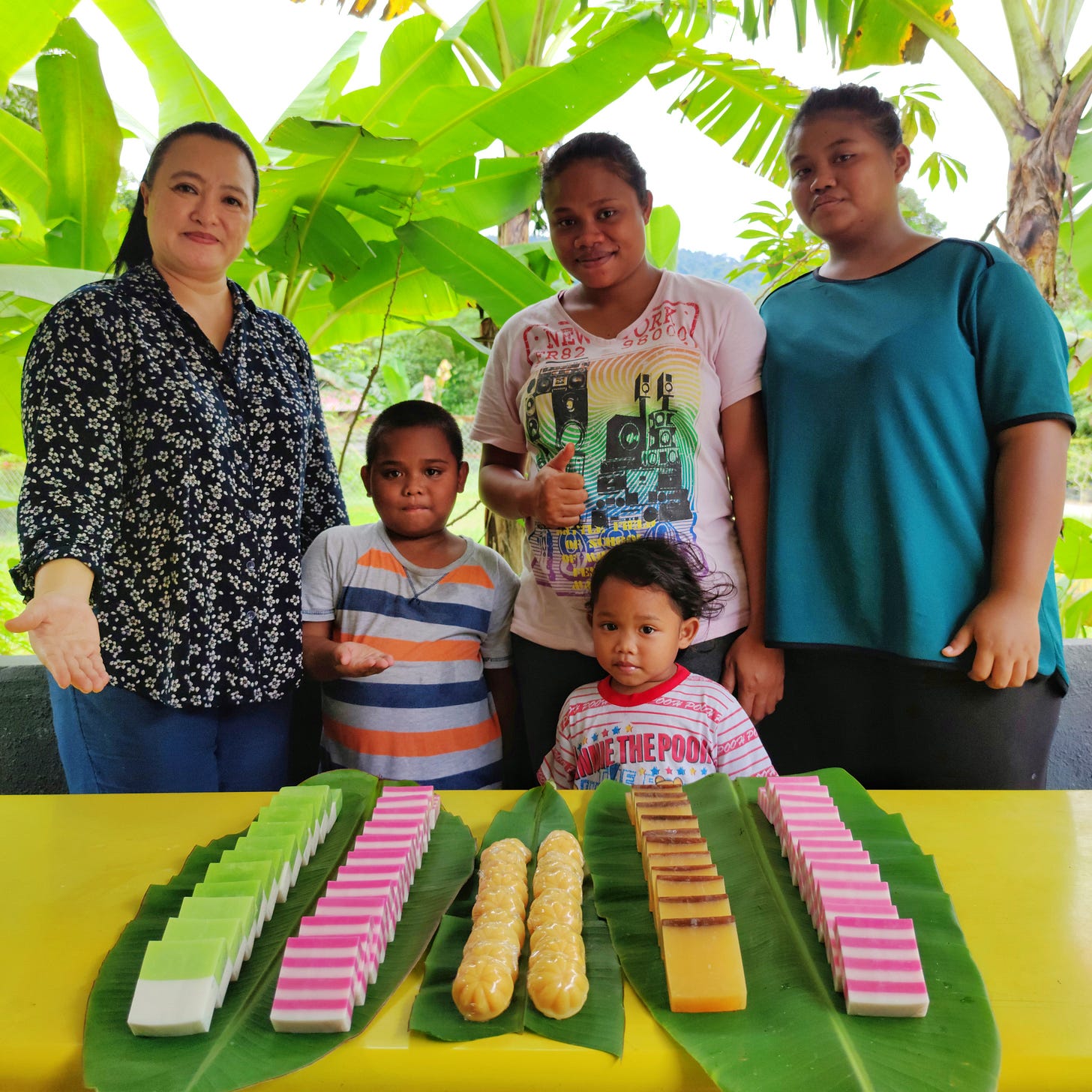“Instead of donating money, we thought, why not help mothers to work from home so they can earn some pocket money for their kids? That was when we brought out first project to Anisah (Kampung Orang Asli Serendah) with the cement pot making project,” Jason Wee shares with Head’s Up on what led to the start of The Asli Co.
It was a natural progression of their relationship with the Orang Asli community. “We needed to make custom pots for our succulents. Instead of making them, we thought why not ask Orang Asli friends to make them,” Jason says.
Both founders, Jason Wee and Lim Xin Yu watched tutorial videos on Youtube, bought some cement, a trowel, some acrylic paint and headed to the kampungs.
“We started with less than RM200 and before we knew it, we had a business. Now, if there’s anything we want to make or produce, we immediately think who in the kampung would like to do it," he says.
Both The Asli Co.’s founders, Jason and Xin started as volunteers building houses for Orang Asli (Indigenous people). Jason had built over 20 houses and Xin has a record of building 13 houses.
It was through these experiences and the gradual experience built with the community, both volunteers noticed many Orang Asli kids were dropping out of school.
According to a few ketua kampungs (village chiefs), close to 50% of kids do not graduate high school. It was simply because parents do not have enough cash to purchase uniforms, books, or even provide canteen money for food.
“It has been wonderful helping our Orang Asli friends earn with dignity. I’ve finally found my calling,” co-founder, Xin says.
Building interest
The social enterprise has trained 34 mothers and will soon be training six more in Kampung Pisang Rasau, Slim River.
The Asli Co. is currently working with four kampungs – Kg. Orang Asli Serendah, Kg Orang Asli Sg Buloh, Kg Orang Asli Bukit Cheding, Kg Orang Asli Ulu Kuang - currently.
“On top of paying the Orang Asli a fair wage for the items they produce, we also source, procure and deliver raw materials, equipment, provide training, handle packaging, marketing and delivery,” Xin says.
The product line currently produced by the Orang Asli in partnership with The Asli Co. includes cement pots with succulents, handmade kuih soaps, sanitisers, fabric masks and pet bandanas.
When developing a product, the social enterprise thinks of three factors. If the products can be produced easily from the kampung, if the unit economics makes sense and if there is a demand.
She also adds that the ladies they work with are eager to learn and utilise their newfound sewing skills to make new products such as pillowcases, tudungs, and curtains for their own use.
Several of the mothers working with the social enterprise is able to make up to RM1,500 a month from sewing masks.
Ayu from Kampung OA Kuang especially enjoys the flexibility of her work. She works for two hours in the morning before the family wakes up and goes about her day and her chores. After dinner, Ayu is back on the sewing machine for another two hours.
“We don’t want to impose on them the idea that they need a better quality of life. Because if you ask me, they are very happy people. Instead of giving monetary aid, we believe in determining what they like to do, and we help to build that interest of theirs,” Jason says.
Additionally, Suraya who sews masks, is also a talented hairdresser and baker for her village. Both Jason and Xin have equipped her with the right equipment to run her business and some lessons on how to calculate costs, profits and pricing strategies.
Another member of the community, Anisah who loves cooking was also helped to start the Orang Asli Culinary Experience in her backyard to enable her to share her cuisine with customers visiting the kampung.
“Many people out there have the skills that the Orang Asli would love to learn. We’d love to work with them (Community Champions) to bridge the gap between the urban folk and our Orang Asli friends.
It’ll be a win-win situation where the Community Champion teaches and earns a royalty for their project, the Orang Asli learns a new skill and has work and at the same time, The Asli Co. has a new product to market for them,” Jason tells Head’s Up.
“This is how we started the mask business. The Community Champion, Jix, trained the Orang Asli on sewing skills, we developed the mask designs, marketed them and handled everything in between,” he adds.
Be kind to one another
However, with the arrival of the pandemic, the social enterprise saw B2B sales for their pots and soaps dwindle as events were cancelled one after another. “Thankfully, we developed sanitisers right before the MCO and fabric masks soon after,” Jason says.
The quick pivot has kept the business afloat. Mothers who were making pots have now transitioned to producing sanitisers to supplement their household income.
The challenge now, is to plan for what comes after the pandemic. Equipped with 18 sewing machines, the Founders believe their team of over 20 women skilled seamstresses can start producing reusable sanitary napkins for other Orang Asli communities.
“This will help them save a lot of money in the long run. We also have other products in the making which we are very eager to launch this year,” he says.
Xin also shares that their customers have been supportive of their products knowing that behind every product, they are supporting a hardworking Orang Asli mother in the kampung. “Generally, people are aware that Orang Asli communities are impoverished, but they do not have a way to help so they have found us to be a great avenue,” she says.
“We hear many stories of them having trouble, for one, assimilating with urban folks. The bullying and name calling at the workplace has caused them to retreat back to the kampung, their comfort zone. If people were more kind to each other, the Orang Aslis with the drive to improve themselves can be allowed to learn, grow, earn more and take care of their families more comfortably,” Xin tells Head’s Up.
“We hope once MCO is over and the Covid-19 cases numbers have decreased, we can continue bringing people into the kampung to enjoy their cooking and learn more about the Orang Asli through food,” she concludes.











Hats off to you,